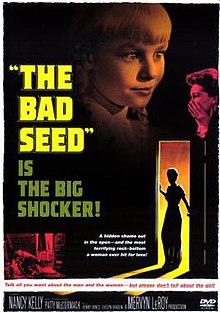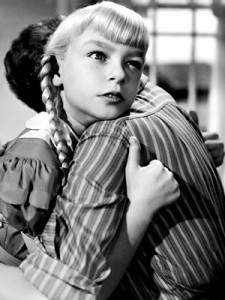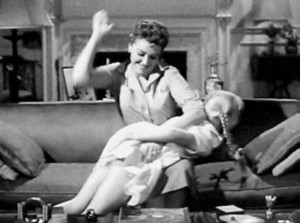Adapted to the screen from Maxwell Anderson’s 1954 Broadway hit (based on William March’s novel), The Bad Seed, the 1956 crime-family melodrama, is thematically outdated, but the movie is highly watchable due to Mervyn LeRoy’s taut direction and excellent female-driven ensemble, headed by Nancy Kelly and Patty McCormack in Oscar-nominated roles.
Grade: B- (*** out of *****)
| he Bad Seed | |
|---|---|
 |
|
The movie is based on a false, dubious premise that evil and the instincts to kill are biologically conditioned. However, at the time, it brought to the screen the heredity versus environment argument.
Mother Chritsine (Nancy Kelly) begins to suspect that something is wrong with her young daughter, Rhoda (Patty McCormack), when a boy is found drowned in a school picnic. To acquire a coveted penmanship medallion, Rhoda kills a boy, making it appear an accident. At the climax, the mother realizes that her own mother was a murderess, and that she herself has passed on the taint, giving birth to a monster. Realizing that if she doesn’t act quickly, tragedy will multiply on tragedy, Christine gives her child overdose of sleeping pills and then shoots herself.
The Production Code tempered with John Lee Mahin’s screenplay. A solution had to be found for the Code provision that murder cannot go unpunished. Under pressure, the last reel deviated from the stage play. The studio was forced to excise the shocker stage ending in which the girl gets away with murder.
Warner benefited from the feud with the feud with the Production Code Administration. It released The Bad Seed with an “Adults Only” warning, a come-on that made the movie all the more popular.
Reviewing the book’s author’s career, James Kelly wrote in the N.Y. Times: “Let it be said quickly, William March knows where human fears and secrets are buried. He announced it in Company K, a novel published twenty years ago and equaled only by Dos Passos’ Three Soldiers as a sampling of men at war. He has proved it again and again in the other novels and short stories, all of them floored and walled in what Clifton Fadiman decided to call “Psychological acumen”. But nowhere is this gift better displayed than in The Bad Seed–the portrayal of a coldly evil, murderous child and what she does to both victims and family. In the author’s hands this is adequate material for an absolutely first class novel of moral bewilderments and responsibilities nearest the heart of our decade.”
 All of the original cast, Patty McCormack, Nancy Kelly, Eileen Heckart, and Henry Jones reprised their stage roles in the screen version.
All of the original cast, Patty McCormack, Nancy Kelly, Eileen Heckart, and Henry Jones reprised their stage roles in the screen version.
One of few films to have received three acting nominations, all for women roles, The Bad Seed earned nods Eileen Heckart and McCormack in the same (supporting) category. Kelly, who had earlier won a Tony for her performance, lost the Best Actress Oscar to Ingrid Bergman, who made a welcomed comeback in “Anastasia.”
Heckart and McCormack lost the Supporting Actress Oscar to Dorothy Malone (“Written on the Wind”). Hal Rosson’s black-and-white cinematography was nominated but he lost to Joseph Ruttenberg for “Somebody Up There Likes Me”.
McCormack’s career demonstrates the curse of typecasting, specifically, what do you do when youve been nominated for an Oscar at the age of 11 for playing a killer kid. In her ensuing lackluster career, McCormack went on to play other troubled characters, in “Miniskirt Mob” (1968) and in “Mommy” (1995), as “Bad Seed” smothering mother who kills to protect her daughter. In short, McCormack experienced what Linda Blair would after her nomination for “The Exorcist”.
The acting is uniformly effective, though Nancy Kelly makes the mother so saturnine and fatalistic that her outburst of frenzy when Rhoda coolly compounds her murders deprives her from the audience’s sympathy.
Best of all is Eileen Heckart, as the distraught, bibulous, alcoholic mother of the drowned boy. The scene in which she asks Rhoda her innocent-pitiful questions about her boy’s last hours is devastating, tearing at your heart.
Stay away from the 1985 remake of “The Bad Seed.”
Eileen Heckart: One of Shortest Nominated Roles in Oscar History
Eileen Heckart received a Best Supporting Actress nomination for what is one of the shortest roles (in terms of screen time) in Oscar history. She basically has 2 scenes, amounting, in toto to less than 10 minutes long.
The first scene, which lasts about 6 minutes, occurs when she arrives at the house, eager to find out the circumstances in which her son died.
The second scene, which takes place in the film’s last reel, she again arrives at the house, this time drunk, holding a bottle in hand. Hysterical and crying, she insists on finding out from the suspect Rhoda whether “It was a fair play? It’s a heartbreaking scene, which ends when her husband comes to escort her out (“it’s time to go home)
http://emanuellevy.com/oscar/oscar-actors-heckart-eileen-3/
Oscar Nominations: 4
Actress: Nancy Kelly
Supporting Actress: Eileen Heckart
Supporting Actress; Patty McCormack
Cinematography (b/w): Hal Rosson
Oscar Awards: None
The winner of the Best Actress Oscar was Ingrid Bergman for Anastasia, and of the Supporting Actress Oscar Dorothy Malone for “Written on the Wind.” Joseph Ruttenberg won the b/w Cinematography Oscar for “Somebody Up There Loves Me.”
DVD
In the DVD edition, you can hear the adult Patty McCormack (who played the murderess little brat in 1956) talking about the film, and playwright-actor-impersonator Charles Busch discussing it as a camp classic that “plays like a gangster.”
Cast
Nancy Kelly as Christine Penmark
Patty McCormack as Rhoda Penmark
Henry Jones as Leroy Jessup
Eileen Heckart as Hortense Daigle
Evelyn Varden as Monica Breedlove
William Hopper as Col. Kenneth Penmark
Paul Fix as Richard Bravo
Jesse White as Emory Wages
Gage Clarke as Reginald ‘Reggie’ Tasker
Joan Croydon as Claudia Fern
Credits:
Produced, directed by Mervyn LeRoy
Screenplay by John Lee Mahin, based on the play The Bad Seed by Maxwell Anderson, based on The Bad Seed by William March
Music by Alex North
Cinematography Harold Rosson
Edited by Warren Low
Production and distribution company: Warner Bros.
Release date: September 12, 1956
Running time: 129 minutes
Budget $1 million
Box office $4.1 million (rentals)












